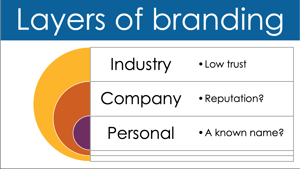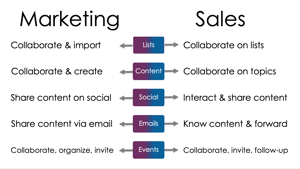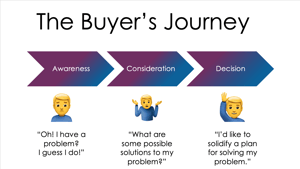Share article
I had the privilege of participating in Keystone Insurers Group's National Conference this year. Billy Bridwell, Senior Vice President of Employee Benefits at Keystone and a beloved Q4iNetwork member, hosted the session and facilitated Q&A with me. We're sharing with you some highlights from the session and some of the discussion we had afterward.
Billy Bridwell: From your experience working with brokers across the country over the past six or seven months, what have you have noticed successful brokers doing to maintain their marketing, prospecting, and new business flow?
Wendy Keneipp: Staying in touch with both clients and prospects. Calls, emails, basic marketing fundamentals like sharing resources on their websites, holding webinars or discussion groups. Just picking up the phone and checking in with people. Not necessarily talking about insurance, but helping them navigate what it means to run a business in this environment. They are establishing themselves as a guide – with answers or with the ability or willingness to find answers.
If you were an independent agency owner or a producer within an agency with limited resources (time, money, capacity), would you consider it more important to focus on a personal brand or an agency-wide brand?

Personal brand.
As an owner of a small agency, it's a tough balance to get in both the company and the personal activity. It can be done, but you need some experience with social media to understand how to navigate it to make a successful run at both personal and company. In this case, I recommend focusing on the personal and making sure you have a company page with the occasional post, so people have something to find when they look you up.
If you're in a larger agency and don't have control over the agency brand, then your focus should be on the things you can control – your LinkedIn presence, your own content, and personal speaking opportunities. You can absolutely develop a name for yourself from within a larger organization – you just have to be dedicated to it and create an individual level of presence.
What are some tips regarding time management to help agency owners and producers be consistent in their marketing/prospecting activities and content creation?
 Company posts – designate someone in the agency to be responsible for this. Spend one hour each week preparing posts for the following week. Schedule them.
Company posts – designate someone in the agency to be responsible for this. Spend one hour each week preparing posts for the following week. Schedule them.
Owners and producers – spend 20 – 30 minutes each day on LinkedIn. Just being present is critical. Develop a habit. Like/comment/share/invite.
Use pre-written content from sources you have, but be smart about it. Take ideas from the content to type up into a post or turn into a graphic. Five hundred words in a paragraph from the original content source may not be appealing, but the highlights boiled down into an infographic with "The 5 Key Ideas" sure could be. Canva is a great source for quickly creating graphics.
Don't post content-laden bulletins on LinkedIn. No one is going to stop scrolling for that. Send that heavy content to clients via email, or share with prospects when it addresses something you've specifically discussed with them.
I like what you said about "the buyer's journey." What can you suggest to help get a fresh perspective on creating marketing content to follow the buyer's journey?
 Think about the type of content buyers are looking for in each phase they go through: Awareness, Consideration, Decision. Pick one challenge your buyers consistently struggle with. Search for (or create) content that addresses that struggle.
Think about the type of content buyers are looking for in each phase they go through: Awareness, Consideration, Decision. Pick one challenge your buyers consistently struggle with. Search for (or create) content that addresses that struggle.
-
-
- What could pique their awareness about the topic? LinkedIn shares of articles or videos on the subject. Blog posts talking about and breaking down the challenges.
- What content is going to help them dig deeper and learn more about that topic? Whitepapers, assessments, checklists to evaluate their situation.
- What content is going to help them get to a decision? Write up case studies. Create testimonial videos.
-
Rinse and repeat for your next topic.
You talked about targeting opportunities – expand on what that looks like and why it is so important.
Not every opportunity is a good one. Just because you can write business doesn't mean it's a good fit for your team and doesn't mean it's a good fit for their company. When we have misalignment, it causes stress in the relationship and causes engagement and morale problems for your team.
When we lead with strong messaging through our marketing fundamentals and prospecting conversations, then we naturally weed people out who are not going to be a good fit for us. Those who are not the right fit won't be attracted to your agency when you talk about your process and the people who thrive with you. Understanding your Brand Message and being able to communicate it on your website is critically important.
Is a cold calling script necessary?
Yes. The reason is that it's scary. No one likes to cold call, and no one wants to receive cold calls. The quicker we can get in, make the point, and get out, the better it is for everyone. Be respectful of their time, and give them a legitimate reason to WANT to talk with you. Having a BECAUSE statement is the key – it connects your desire to their need, and most importantly, it gives purpose to WHY they would choose to meet with you.
Also, there's been so much bad behavior and bait-and-switch with cold calling that staying on script keeps it much cleaner and keeps the conversation honest.
There's a lot of opportunity hidden in phone calls. So many are afraid to pick up the phone that it seems to be a lost method for filling the pipeline, but despite what many would like you to believe, cold calling is not dead! It does become more comfortable if you connect with people in multiple ways, so if you've established some name familiarity already, then it's not a cold call, it's a warm call. 😀
What is one tip to boost LinkedIn effectiveness?
Show up every day — the most important thing.
Check your LinkedIn Social Selling Index and heed the guide that makes up the four components of the score: Have a professional profile; Engage with insights; Find the right people; Build relationships.
LinkedIn has identified these as essential behaviors to establish because they know that salespeople who adhere to these behaviors consistently have improved sales results.
When creating and hosting events, how important are pre and post activities?
Absolutely critical. The most important things are the pieces that people tend NOT to do: Producers engaging in the invitation process and producers following up after the event.
We have an agency in the network that uses webinars and roundtables as a primary activity for pipeline filling – they have set over 100 appointments in the last few months alone from this method! Discipline is key.
A great point you made: Prospects need to be interested in your content to be interested in your sales conversation!
💯! Think of it as dating. If you're not having fun on the dates, why would you want to consider marriage?!
Your content should be a direct reflection of your agency's thinking. We need to see collaboration between sales and marketing by discussing what everyone is seeing and hearing. If you're not making time for open conversations to discuss these ideas, then you're going to struggle with content development.
Make time to talk. Debrief from client and prospect meetings. Brush up on your marketing fundamentals. Bring ideas from industry publications, new vendors in the market, what you hear on the streets, and/or troubles you're starting to see emerge. Get ahead of these ideas and talk about them to raise awareness among your audience.
Content provided by Q4intelligence and partners
Photo by alphaspirit
